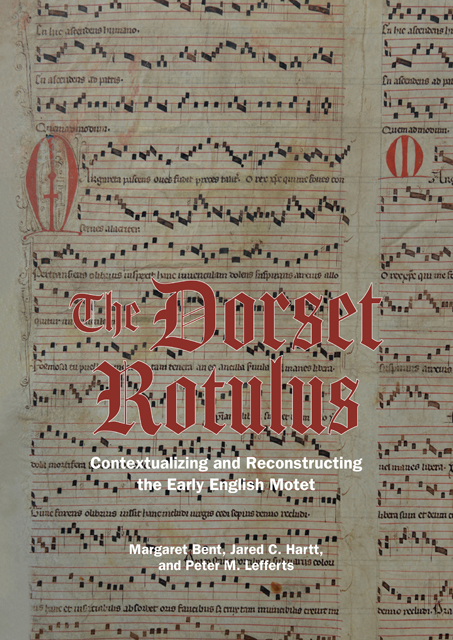Book contents
- Frontmatter
- Contents
- List of Figures
- List of Music Examples
- List of Tables
- Abbreviations
- Note on the Transcriptions
- Introduction
- 1 The Source and its Contents
- 2 Contexts and Designs
- 3 Voice-Exchange Motets and Ascendenti sonet geminacio/ Viri Galilei
- 4 Margareta pascens oves and its Large-Scale Comparands
- 5 Rota versatilis: Towards a Reconstruction
- 6 The Curious Case of Regina preminencie/ Gemma nitens/ … mater es intacta
- 7 Introducing Naufragantes visita/ Navigatrix inclita/ T. Aptatur/ … velox perpetrat
- 8 The Musical Rotulus: Artifact, Image, and Attributes
- 9 Epilogue: Conclusions and Speculation
- Appendix: Transcriptions, Texts, and Translations of the Four Dorset Motets
- Bibliography
- Index of Manuscripts
- Index of Musical Compositions
- General Index
- Studies in Medieval and Renaissance Music
Introduction
Published online by Cambridge University Press: 14 January 2023
- Frontmatter
- Contents
- List of Figures
- List of Music Examples
- List of Tables
- Abbreviations
- Note on the Transcriptions
- Introduction
- 1 The Source and its Contents
- 2 Contexts and Designs
- 3 Voice-Exchange Motets and Ascendenti sonet geminacio/ Viri Galilei
- 4 Margareta pascens oves and its Large-Scale Comparands
- 5 Rota versatilis: Towards a Reconstruction
- 6 The Curious Case of Regina preminencie/ Gemma nitens/ … mater es intacta
- 7 Introducing Naufragantes visita/ Navigatrix inclita/ T. Aptatur/ … velox perpetrat
- 8 The Musical Rotulus: Artifact, Image, and Attributes
- 9 Epilogue: Conclusions and Speculation
- Appendix: Transcriptions, Texts, and Translations of the Four Dorset Motets
- Bibliography
- Index of Manuscripts
- Index of Musical Compositions
- General Index
- Studies in Medieval and Renaissance Music
Summary
Musicologists are dependent on the vigilance and generosity of colleagues for information about new discoveries that turn up in unexpected places. Julia Craig-McFeely, as manager of DIAMM, was informed on 2 February 2017 of a new discovery in private possession by Mark Forrest, archivist at the Dorset History Centre. With his preliminary photographs, I was able to affirm the importance of the new find: two trimmed and nearly adjacent parchment membranes from the beginning of what must have been an imposing English polyphonic rotulus of the early fourteenth century containing four large-scale motets. I provided a preliminary description of these major compositions, all damaged and incomplete due to trimming. Three were known in fragmentary or different form elsewhere, and one was completely new.
I was asked not to make the discovery public because of the sensitivity of their private ownership, but the intention was to transfer them to a public repository. The fragments are now on deposit at the Dorset History Centre, where they have been flattened and restored and are publicly accessible; they are now available on DIAMM. The call number is Dorset History Centre (D.H.C.), D-FSI, acc.10959. The two fragments are designated 10959a and 10959b. They will be referred to here as a and b, the source as a whole as Dor. They were previously held at Melbury House, Melbury Sampford, Dorset, the seat of the Strangways family, subsequently the Earls of Ilchester, and remain the property of the family.
It may seem disproportionate that a whole book is here devoted to the contents and context of just two fragments from a lost music manuscript, but it has proved opportune to reevaluate the English motet of the period and to situate the new discovery in relation to comparable compositions. English medieval polyphony survives almost entirely as fragments. There are no complete or nearly complete English manuscripts between the Winchester Troper of c. 1000 and the Old Hall manuscript, compiled for the chapels of Thomas Duke of Clarence and then of Henry V in the 1410s. Even that, with 112 folios of English sacred music from the late fourteenth and early fifteenth centuries, is only three-quarters complete. Everything between these dates is fragmentary, mostly leaves recovered from bindings, often cut down and lacking their facing pages, with the consequence that a high proportion of the compositions represented are also incomplete.
- Type
- Chapter
- Information
- The Dorset RotulusContextualizing and Reconstructing the Early English Motet, pp. 1 - 4Publisher: Boydell & BrewerPrint publication year: 2021



